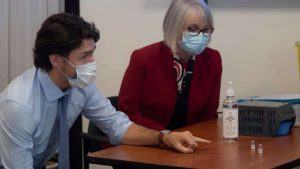Trudeau says Pfizer CEO assured him that vaccines will arrive in February

Prime Minister Justin Trudeau said today the CEO of Pfizer has personally assured him that the pharmaceutical company will send vaccine shots to Canada next month.
Pfizer to temporarily reduce vaccine deliveries to Canada, minister says
The promise from Dr. Albert Bourla, the company’s top executive, comes after Canada learned it wouldn’t receive a single vial of the highly effective vaccine next week, as Pfizer pauses some deliveries while it retools its Belgian manufacturing plant.
Maj.-Gen. Dany Fortin, the military commander leading vaccine logistics for the Public Health Agency of Canada (PHAC), has said Pfizer’s deliveries will be reduced by up to 50 per cent over a four-week period, punting as many as 400,000 doses to a later date.
The delivery delay is already prompting some provinces — notably Alberta and Ontario — to warn that they will have to curtail vaccination appointments in the weeks ahead as they direct the existing supply of the two-dose Pfizer vaccine to patients who need their second shots.
“The next few weeks will be challenging when it comes to deliveries,” Trudeau told reporters. “That said, Dr. Bourla assured me that hundreds of thousands of Pfizer doses will be delivered the week of February 15 and in the weeks to follow.”
Trudeau said that, despite the delivery hiccup, the company still expects to meet its promised delivery target of four million doses by the end of March — enough shots to fully vaccinate 2 million Canadians.
Trudeau’s call with Bourla is the prime minister’s first known personal intervention in vaccine deliveries.
When asked Tuesday if he would lobby Pfizer to send more doses, Trudeau said Public Services and Procurement Minister Anita Anand was the lead on the file.
The prime minister of Israel has had more than a dozen phone conversations with the CEO of Pfizer and the president of the European Union has personally reached out to the company’s leadership.
Pfizer isn’t treating every customer the same way. While Canada will receive no doses next week, the company said it “will be back to the original schedule of deliveries to the European Union beginning the week of Jan. 25.”

Pfizer is grappling with unprecedented global demand for its vaccine as the world scrambles to inoculate patients against the deadly novel coronavirus.
While the company had projected it could manufacture up to 1.3 billion shots this year alone, it is now shifting gears to pump out even more.
The company is making upgrades to its Belgian plant so that it can manufacture up to two billion doses this year. In order to complete those upgrades, some production lines will have to be idled and Pfizer won’t have enough vials to go around in the short term to meet its previously promised delivery schedule.
Beyond the Pfizer product — which, to this point, had been delivered weekly — Canada is expecting shipments of the Moderna product to continue uninterrupted. Trudeau said about 500,000 Moderna shots will be delivered to Canada in February. The Moderna doses are to be delivered every three weeks.
‘No unexpected vaccine safety issues,’ Tam says
Dr. Theresa Tam, Canada’s chief public health officer, said PHAC has been monitoring the vaccine rollout for any significant adverse medical events following immunizations.
With some 700,000 shots administered so far, the department had documented just 90 such events nationwide as of Jan. 15.
An adverse event is defined as a medical problem that happens during or after treatment with a vaccine. These problems are not necessarily caused by the vaccine itself, Tam said.
Of the 90 reported adverse events, 27 were considered serious — they included severe allergic reactions, Tam said. Based on that data, the probability of someone experiencing a severe medical side effect post-vaccination is just 1 in 22,000.
“To date, no unexpected vaccine safety issues have been identified,” Tam said.








Redes Sociais - Comentários